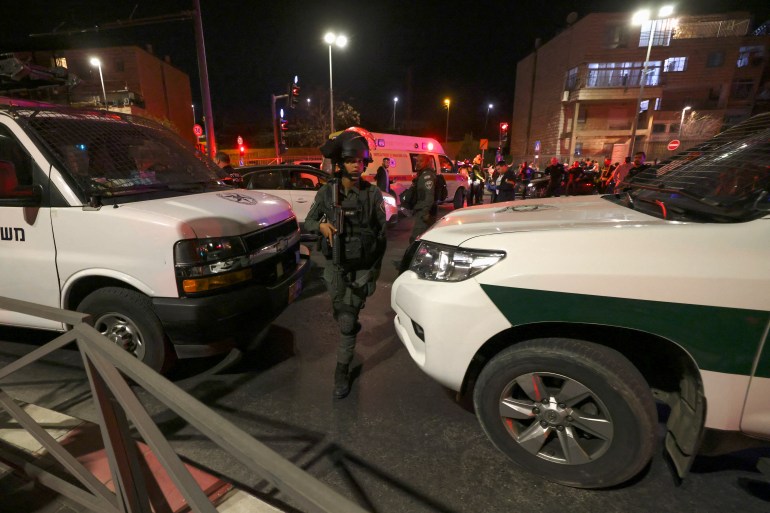After Friday’s shooting, the Magen David Adom emergency service said it was treating 10 wounded, some in critical condition.
“What we understand happened was a car pulled up at the front of a synagogue, a gunman got out and opened fire,” Al Jazeera’s James Bays reported from the scene of the attack in the illegal Israeli settlement of Neve Yaakov.
“The figures we have now are seven people dead,” said Bays, adding that police said the suspect had no previous “security record”.
There was no immediate claim of responsibility. The emergency response agency reported a total of 10 gunshot victims, including a 70-year-old man and a 14-year-old boy.
TV footage showed several victims lying on the road outside the synagogue being tended to by emergency workers.
“I heard a lot of bullets,” Matanel Almalem, an 18-year-old student who lives near the synagogue, told the AFP news agency.
An earlier police statement said there was a “terror attack in a synagogue in Jerusalem” and that “the shooting terrorist was neutralised [killed]”. Police later said the suspect was a 21-year-old resident of East Jerusalem.
The attack comes a day after a deadly Israeli raid in the Jenin refugee camp in the occupied West Bank. Nine Palestinians were killed, including an elderly woman, after dozens of Israeli soldiers attacked a house the army said contained suspected fighters, leading to several hours of intense confrontations.
A 22-year-old Palestinian man also was shot by Israeli forces in the town of al-Ram, north of Jerusalem, on Thursday.
Gaza fighters then fired rockets and Israel carried out air raids overnight, but the exchange was limited.
‘A natural response’
Hazem Qassem, a spokesperson for Hamas, the Palestinian faction that controls the Gaza Strip, told the Reuters news agency that Friday’s attack was “a response to the crime conducted by the occupation in Jenin and a natural response to the occupation’s criminal actions”.
Qassam did not claim the shooting. The Palestinian Islamic Jihad also praised but did not take responsibility for the attack.
Israeli military raids in the occupied West Bank have become an almost daily occurrence over the last year with at least 200 Palestinians — fighters and civilians — killed. Israeli civilians and troops also have been killed in attacks by Palestinians in Israel and the occupied territory.
Friday’s shooting came just hours after Palestinians marched in anger as they buried the last of those killed by Israeli troops the previous day.
Scuffles between Israeli forces and Palestinian protesters erupted in the occupied West Bank throughout the day, including after the funeral for the 22-year-old killed north of Jerusalem.
Crowds of Palestinians waved the flags of both Fatah, the party that controls the Palestinian Authority, and Hamas. In the streets of al-Ram, masked Palestinians threw stones and set off fireworks at Israeli police who responded with tear gas.
The escalation of violence also comes just days before US Secretary of State Antony Blinken is expected to visit Israel and the occupied West Bank. “We strongly condemn the heinous terror attack that took place this evening at a synagogue in Jerusalem, and are shocked and saddened by the loss of life,” the White House said in a statement on Friday.
Netanyahu to convene security cabinet
Israel’s far-right National Security Minister Itamar Ben-Gvir visited the scene soon after the East Jerusalem attack. “We need to react, the situation cannot go on like this,” he said.
Speaking to reporters at Israel’s national police headquarters, Prime Minister Benjamin Netanyahu said he had held a security assessment and decided on “immediate actions”.
He said he would convene his security cabinet on Saturday night, after the end of the Sabbath, to discuss a further response. Netanyahu declined to elaborate but said Israel would act with “determination and composure”.
He also called on the public not to take the law into their own hands.
The shooting was the deadliest for Israelis since a 2008 attack killed eight people in a Jewish seminary, according to Israel’s foreign ministry.
Months of violence in the occupied West Bank have heightened concerns the already unpredictable conflict may spiral out of control, triggering a broader confrontation between Palestine and Israel.
Israel and Hamas have fought four wars and several smaller skirmishes since the group took power in Gaza in 2007. Tensions have soared since Israel stepped up raids in the occupied West Bank last March.

